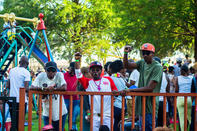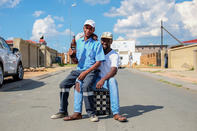Township Slang
The people of Soweto speak Zulu. They also speak Sotho, Tswana, and Xhosa, intermingled with a number of different vernacular dialects. They speak English and passable Afrikaans if they choose to. When they chat the banter drifts through all of these languages, fused together by township slang, with each generation having its own fashionable variation.

The people of Soweto are all black, yet they originate from ethnic backgrounds as diverse as the many nations of Europe. There are Zulus who cling to their traditional colourful dress, elaborate beadwork and copper bangles, women with mudpack hairdos that resemble the tops of Egyptian columns, men with large wooden ear lobe plugs or the holes where these plugs used to be. There are refugees from war-torn Mozambique in tattered rags and odd shoes.
There are the 'cats' who could have stepped right out of New York's Harlem, complete with ghetto blasters and shades. There are matronly 'mammas' and pantsulas, the gangster types with fedora hats, expensive jarman shoes and wide-legged, turn-up flannels with narrow belts worn low on the hips. There are sangomas in skins, coal merchants urging on their tired horse carts, and nattily dressed businessmen driving luxury cars.
An African Melting Pot

The people of Soweto, their parents or grandparents came from the rolling hills of Natal or the montane villages of the Eastern Cape, from the dusty plains of the Kalahari, or the Bushveld kraals of Limpopo.
They form the most diverse community in southern Africa and the most adaptable one, for they have to live a life dogged by the vagaries of apartheid laws, dodging the police who prowl the darkened streets, and the tsotsis who lurk in the plots of open veld; they must keep an eye peeled for con men and, with the rent boycotts, for the rent men too.
Sowetans are not all the fist-clenching revolutionaries portrayed in the international media. Far from it: they are men and women trying to survive and to create secure family nests. Theirs is a large township, and like all townships and cities, it is a melting pot of people pursuing all manner of activities: young and old, men and women, the rich, the poor, tinkers, tailors, soldiers of the revolution and sangomas.
Yes, there are the rich, even the very rich, but for the most part Soweto is home to the workers, the men and women who turn the wheels of the mines and the factories, who sweep the floors and dig the trenches, who lay the rails and lift the bales, who 'party' and get drunk... some of whom end up dead, many of whom eventually land up in prison.
This prison may be 'The Island' (The country's most notorious island jail on Robben Island in Table Bay), political university of black South Africa; more likely it will be 'Sun City' on the south-eastern side of Soweto (Modderbee Prison to the uninitiated, and not to be confused with white hotel tycoon Sol Kerzner's homeland gambling emporium of the same name.